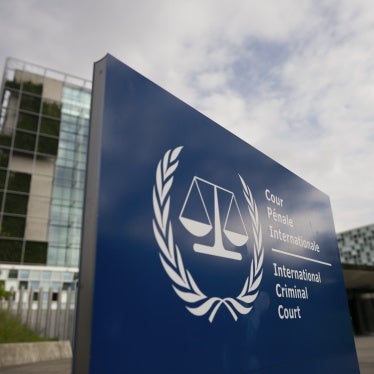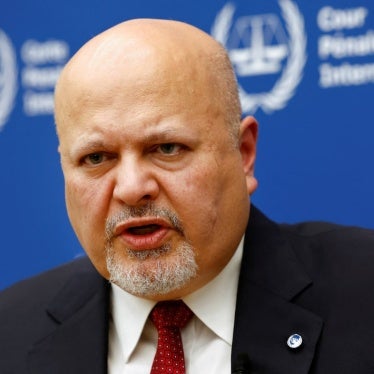The Rt. Hon. Lord David Cameron
Secretary of State for Foreign, Commonwealth and Development Affairs
King Charles Street, London SW1A 2AH
Via email
June 10, 2024
Dear Foreign Secretary,
Re: UK Response to Applications for Arrest Warrants and Threats to the International Criminal Court
We write to you regarding the UK Government’s response to the applications for arrest warrants by the International Criminal Court (ICC) prosecutor, Karim Khan, and the threats aimed at undermining the court.
On May 20, the prosecutor applied to the ICC’s judges for arrest warrants against three Hamas leaders (Yahya Sinwar, Mohammed Diab Ibrahim Al-Masri – more commonly known as Mohammed Deif – and Ismail Haniyeh) and two senior Israeli officials (Benjamin Netanyahu and Yoav Gallant) for alleged crimes committed since October 7, 2023, in relation to his ongoing Palestine investigation.
UK Response
Minister Andrew Mitchell made a ministerial statement on May 20 in response to the prosecutor’s announcement, asserting: “As we have said from the outset, we do not think that the ICC has jurisdiction in this case. … The UK has not recognised Palestine as a state, and Israel is not a state party to the Rome statute.”
Contrary to this position, however, the ICC’s jurisdiction in this case is well-established. The UN General Assembly recognised Palestine as a non-member observer state in 2012, and it joined the ICC in 2015. In a 2021 Pre-Trial Chamber ruling that is dispositive for all 124 states parties to the ICC, including the UK, ICC judges also held that Palestine is a state party to the Rome Statute. It is notable that the UK neither objected to Palestine acceding to the ICC nor intervened in the case on whether Palestine is a State for the purpose of the ICC Statute.
We also note the statements of ministers last year when asked about the UK Government’s views of the ICC’s jurisdiction in Gaza. On November 14, Minister Mitchell stated that “It is not for Ministers to seek to state where the ICC has jurisdiction; that is for the chief prosecutor. The chief prosecutor has not been silent on this matter, and I am sure he will continue to express his views.”
Minister Mitchell’s statements of May 20 are contrary to the views of the Independent Panel of Experts in International Law (consisting of many UK citizens, including the former Deputy Head of FCDO Legal Advisers) convened in January 2024 at the request of the prosecutor, which agreed with the prosecutor’s assessment that the ICC has jurisdiction over crimes committed in Palestine. It further stated that:
“The Panel also agrees that the Court has jurisdiction over crimes committed by Palestinian nationals inside or outside Palestinian territory under article 12(2)(b) of the Statute. The ICC therefore has jurisdiction over Israeli, Palestinian or other nationals who committed crimes in Gaza or the West Bank. It also has jurisdiction over Palestinian nationals who committed crimes on the territory of Israel, even though Israel is not an ICC State Party. The basis for the Court’s jurisdiction is that Palestine, including Gaza, is a State for the purpose of the ICC Statute. The ICC’s Pre-Trial Chamber has already ruled that the Court’s jurisdiction extends to Palestine, as a State Party to the ICC Statute, on this basis.”
We urge the UK to express its support for the critical work of the ICC to advance justice for grave international crimes across its docket, including the Palestine situation. We welcome Minister Mitchell’s indication that the UK will render any assistance necessary to execute any arrest warrants the court may issue, and further urge the UK to make clear that the court’s judges have full support in undertaking their independent examination of the prosecutor’s applications and to press Palestinian and Israeli authorities to cooperate with the court.
Arms Sales
On arms sales, Minister Mitchell stated that “no country has suspended existing arms sales arrangements and agreements” to Israel. However, Belgium, the Netherlands, and Slovenia have suspended arms exports to Israel, while Canada, Italy and Spain have announced that they are suspending the issuing of new licenses. The Minister’s statement therefore is inconsistent with the Ministerial Code which request ministers to give accurate and truthful information, and a public correction is warranted.
We remain greatly concerned that the UK Government has still not suspended the licensing of arms exports to Israel, in line with its domestic and international obligations (as we set out in our letters to the government in December 2023 and February 2024). This is despite the ongoing and repeated violations by Israel of international humanitarian law. We also note three orders by the International Court of Justice (ICJ) in the case brought by South Africa against Israel under the Genocide Convention, the first of which on January 26 found that it was necessary to issue measures “to protect the rights claimed by South Africa that the Court has found to be plausible,” including “the right of the Palestinians in Gaza to be protected from acts of genocide”. The Israeli Government has failed to comply with at least some measures ordered by the ICJ.
We kindly request answers to the following questions by June 28, 2024:
- Is the UK’s position that the ICC does not have jurisdiction over crimes committed by Palestinian armed groups in Israel?
- Is the UK’s position that the ICC does not have jurisdiction over crimes committed by Israeli nationals in Palestine?
- Whether and how does the prosecutor’s decision to seek arrest warrants against Benjamin Netanyahu and Yoav Gallant factor into the UK’s ongoing review of its arms licenses to Israel?
- Whether and how does the Israeli Government’s failure to abide by at least some of the binding provisional measures ordered by the ICJ factor into the UK’s ongoing review of its arms licenses to Israel?
- Will the UK Government issue a correction to the effect that other countries have suspended arms exports to Israel?
- Can the UK Government confirm that it will cooperate with the ICC and execute any arrest warrants issued against members of Palestinian armed groups or Israeli officials?
Threats to the ICC
The UK should also, as an ICC member committed to a rules-based international order, protect the court’s independence and publicly condemn efforts to impede, intimidate, retaliate against or interfere with the court’s work, its officials, and those cooperating with the institution.
On April 24, 12 US senators wrote to Khan, threatening to end all US support to the ICC, sanction the institution and its officials, and bar the prosecutor and court staff from entering the United States if steps were taken to pursue warrants against Israeli officials.
On June 4, the US House of Representatives passed a bill aimed at imposing sanctions on foreign persons directly engaged with or supporting the ICC’s efforts to investigate, arrest, detain, or prosecute a protected person, namely, a US citizen, entity, or person living in the US, or a citizen or resident of a US ally. The Biden administration has made clear in a “statement of administration policy” that it opposes this bill and threats to court officials. A version of this bill will now go to the Senate for consideration.
Meanwhile, there have been reports that the Israeli Government was seeking support from ICC member countries, including the UK, and other governments in opposing Khan’s ongoing Palestine investigation. Israeli Prime Minister Benjamin Netanyahu has also publicly denounced the ICC and called on governments to thwart the court’s efforts to scrutinise Israeli actions. In addition, concerning media reports have emerged about alleged Israeli efforts to pressure the former ICC prosecutor to abandon the probe into the Palestine situation. The prosecutor’s Office issued a statement on May 3 noting the court’s jurisdiction over offenses against the administration of justice and “insist[ing] that all attempts to impede, intimidate, or improperly influence its officials cease immediately.” The presidency of the ICC's governing body, the Assembly of States Parties (ASP), has also called for respect for the court’s independence in the wake of these latest threats, and a number of ICC member countries condemned the threats and expressed support for the court’s independence.
We also note that the offences against the administration of justice of the Rome Statute form part of UK domestic law under the International Criminal Court Act. These make it a criminal offence to impede, intimidate or corruptly influence an official of the ICC to force or persuade them not to perform, or to perform improperly their duties. A separate criminal offence is retaliating against an ICC official on account of duties they have performed.
This is not the first time the ICC has faced politicised opposition. Among other examples, as you know, the former US administration abused its sanctions regime against the former ICC prosecutor in a bid to undermine or deter investigations that could implicate US or Israeli nationals. At the time, the UK and other states spoke out for the court. Similarly, the UK and the ASP presidency publicly condemned attacks against the court following its issuance of an arrest warrant for Russian president Vladmir Putin as part of the prosecutor’s ongoing Ukraine investigation. In 2023, Russia issued arrest warrants against Karim Khan and six of the court’s judges. Russian lawmakers have also enacted a law criminalising cooperation with the ICC.
The ICC plays an essential role as a court of last resort to deliver justice to victims of the world’s worst crimes. ICC members like the UK have a responsibility to protect the court’s impartiality and independence across all situations on its docket. In this respect, we urge you to consider taking up measures outlined in a “toolkit”endorsed by the ASP to address threats against the court, including through the use of joint public statements and bilateral political dialogue.
Regrettably, many ICC members were initially silent on the importance of pursuing accountability and justice before the court for both Israeli and Palestinian victims, who have faced a wall of impunity for decades. This has led to perceptions of double standards, putting the ICC’s legitimacy at risk. It is crucial that the ICC can investigate and prosecute grave international crimes across all situations. We urge you to make clear that your government stands with those who seek justice for atrocity crimes, not those who threaten and harass the prosecutors and judges who aim to bring war criminals to justice. We urge you to make public that no UK official has or will engage in attempts to influence the prosecutor or any ICC official to not perform their duties to seek justice, and you reject the call of states that have asked you to do so.
Again, we ask that the UK support the ICC’s efforts to advance justice for grave crimes committed in Israel and Palestine, and urgently defend the court against attempts aimed at obstructing the course of justice. Whether the ICC can meaningfully and effectively deliver on its mandate will largely depend on the will of the international community and ICC member countries like the UK to support impartial and independent justice no matter where the abuses are committed and by whom.
Thank you for your attention to these important issues and we remain available to discuss these matters further.
Yours sincerely,
Yasmine Ahmed
UK Director
Human Rights Watch
Copying to Legal Advisers at the FCDO, and UK Ambassadors in The Hague and New York.







